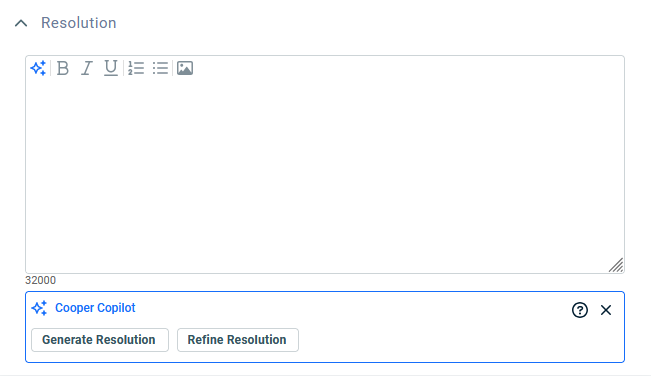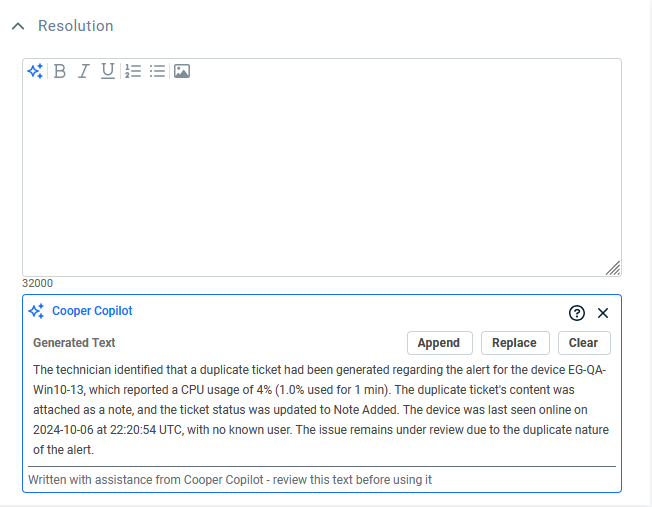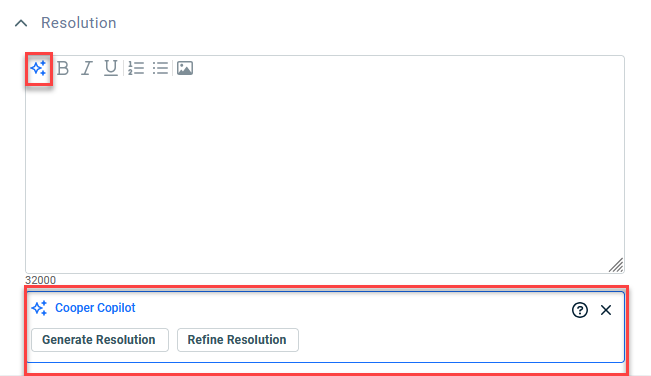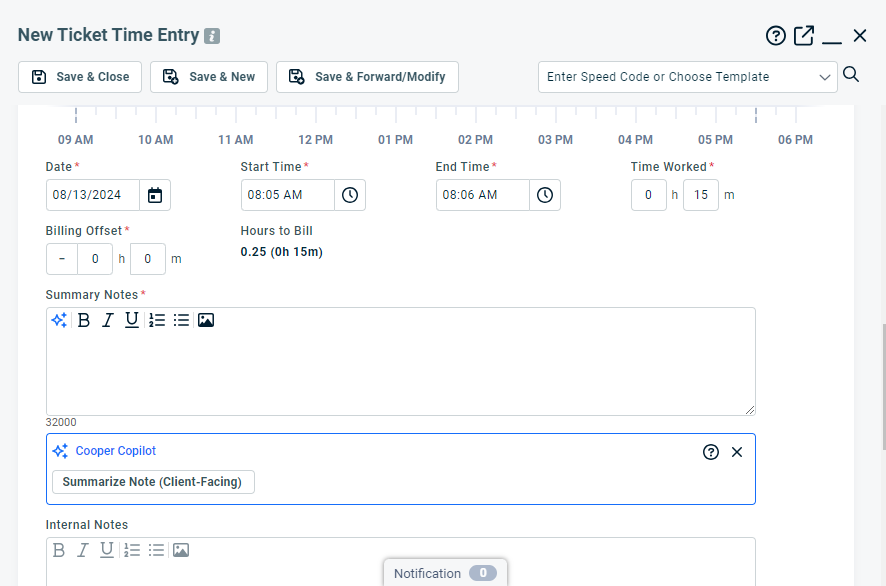Cooper Copilot
PERMISSIONS Security level with Admin Feature Access permission to Cooper Copilot.
NAVIGATION Left Navigation Menu > Admin > Admin Categories > Automation > Cooper Copilot
IMPORTANT Cooper Copilot features are included with an Ultimate Autotask subscription. Refer to Upgrading to ultimate for more information.
BEFORE YOU BEGIN This feature may be hidden in your Autotask instance because it is not activated. If so, you can activate it on the Left Navigation Menu > Admin > Admin Categories > Activations page. Refer to Activations.
Cooper Copilot for Autotask introduces AI-powered tools—Smart Ticket Summary, Smart Writing Assistant, Smart Resolution Summary, and Smart Ticket Triage—to streamline documentation, enhance communication, and improve ticket triaging for greater team efficiency.
IMPORTANT Selecting a form template is the equivalent of manually populating the form. Form template settings will override any previously populated field content, including notification settings, additional contacts, and secondary resources.
To enable or disable Cooper Copilot settings:
-
Navigate to Left Navigation Menu > Admin > Admin Categories > Automation > Cooper Copilot > Cooper Copilot Settings.
-
Toggle the Enable Cooper Copilot button.
-
Select the checkbox next to the setting(s) you wish to enable or disable.
-
Click Save Changes.
With Cooper Copilot:
-
Succinct, AI-powered analysis of an Autotask ticket surfaces key details, actions taken, and next steps. A 1-click solution to getting your team up-to-speed on ticket information.
Improve your Ticket Summaries:
-
Smart Ticket Summaries use key ticket information in order to provide quick, up-to-date information to help you get informed about an ongoing ticket. To improve the accuracy and consistency of this information, be sure you and your team provide key information in the Description, Ticket Notes and Time Entries. Internal Notes will not be utilized for these Ticket Summaries.
Additionally, be sure to include key ticket information such as the following:
-
Issue-Type
-
Sub-Issue Type
-
Any devices related to or impacted by the issue
With limited information available, a Smart Ticket Summary will be restricted on its ability to provide information:
-
"I checked all 79 AP are online and rebooted the closet AP and confirmed with Sandy that there were no more issues."
With additional information added to the ticket as described above, Smart Ticket Summary can become far more useful to your team:
-
"Tristan verified that all 79 Access Points (APs) at the Dover office are online. He rebooted the closet AP and confirmed with Sandy that the issue has been resolved. No further action is required at this time."
Smart Resolution Summary is available in the Resolution field when editing a Ticket. To show or hide the available options, click the ![]() icon. The Resolution field’s visibility is controlled by your Ticket Category. Refer to The General tab.
icon. The Resolution field’s visibility is controlled by your Ticket Category. Refer to The General tab.
-
From an existing ticket, click the Edit button and navigate to the Resolution field.
-
Click Generate Resolution to create a new Resolution summary from the Ticket information, Notes, and Time Entries.
-
Click Append to add the generated text to the Resolution field or Replace to replace any existing text.
-
Click Save to confirm all changes.
-
From an existing ticket, click the Edit button and navigate to the Resolution field.
-
Click Refine Resolution to take the information from within the Resolution field and provide a summarized and refined version of this information.
-
Click Append to add the generated text to the Resolution field or Replace to replace any existing text.
-
Click Save to confirm all changes.
-
From an open ticket, click New Time Entry or New Note.
-
Add your notes in the Summary Notes or Description and complete all other required fields.
-
Click Summarize Notes (Client-Facing).
-
Select if you want to Append or Replace your current notes with the new Smart Writing Assistant text.
-
Click Save & Close to confirm all changes.
Cooper Copilot supports generating content in multiple languages.
To set a Default Language:
-
Navigate to Left Navigation Menu > Admin > Admin Categories > Automation > Cooper Copilot > Cooper Copilot Settings.
-
In the Languages section, select a language from the Default Language drop-down list.
-
Click Save Changes.
NOTE Only one Default Language can be selected at a time. This Default Language applies to all Cooper Copilot generated content, unless the user specifies another language.
To enable or disable other supported languages, check the boxes next to the desired languages. When multiple languages are selected, they will be available alongside the default language.
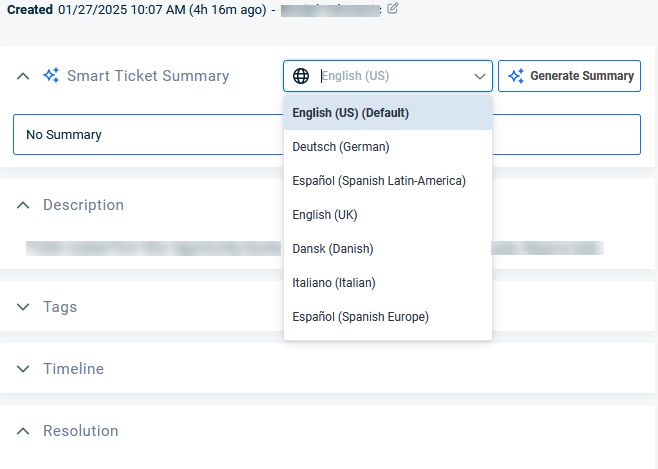
Supported Languages:
-
Arabic
-
Chinese (Simplified)
-
Chinese (Traditional)
-
Croatian
-
Danish
-
Dutch (Belgium)
-
Dutch (Netherlands)
-
English (UK)
-
English (US)
-
Spanish (Spain)
-
Spanish (Latin-America)
-
Faroese
-
Filipino
-
French (Canada)
-
French (France)
-
Greek
-
Hebrew
-
Hindi
-
Hungarian
-
Icelandic
-
Italiano (Italian)
-
Japanese
-
Korean
-
Latvian
-
Macedonian
-
Malay
-
Maltese
-
Māori
-
Norsk (Norwegian Bokmål)
-
Polish
-
Portuguese (Brazil)
-
Portuguese (Portugal)
-
Suomi (Finnish)
-
Svenska (Swedish)
-
Swedish
-
Thai
NOTE The default language is not available for selection.
Smart Ticket Triage uses AI and association algorithms to streamline ticket management by identifying missing information and highlighting similar tickets, improving triage efficiency for newly created tickets. When enabled, Smart Ticket Triage suggestions will appear for users opening a ticket—if the ticket category supports it.
IMPORTANT Smart Ticket Triage suggestions will apply to tickets with a status of New only.
To enable Ticket Triage and set rules for Cooper Copilot to use when analyzing tickets:
-
Navigate to Left Navigation Menu > Admin > Admin Categories > Automation > Cooper Copilot > Cooper Copilot Settings.
-
Select the Ticket Triage tab.
-
In the Analyze tickets with these Statuses section, use the dropdown to select the ticket statuses you want to include in the analysis. For the best results, it is recommended that you select statuses that are usually associated with completed or closed tickets. You can select up to five statuses for analysis.
NOTE Smart Ticket Triage will use these statuses as a historical reference only. Any ticket suggestions will apply to tickets with a status of New. For the fields that are used during analysis, refer to Ticket fields eligible for analysis.
-
In the Analyze tickets in these Queues section, use the drop down to select the ticket queues you want to include in the analysis. For the best results, it is recommended that you select queues that are usually associated with completed or closed tickets. You can select up to five queues for analysis.
NOTE Smart Ticket Triage will use the queues as a historical reference only. Any ticket suggestions will apply to tickets with a status of New. For the fields that are used during analysis, refer to Ticket fields eligible for analysis.
-
In the Analyze Tickets created on or after section, select a date to have Cooper Copilot analyze only tickets created after that date.
NOTE As a best practice, for optimal ticket analysis results, use a date range within the last 6–8 months to ensure the most accurate and relevant data set. If no date is selected, only tickets from the past 24 months will be analyzed.
-
Toggle the Automatically display suggestions on Ticket Detail if you want to have suggestions automatically shown when a user clicks on the Ticket Detail page.
-
In the Excluded Organizations section, choose any organizations you want to exclude from triage analysis.
NOTE Excluded organization's tickets will not display the Smart Ticket Triage section or insight. There is not a limit to the number of organizations that can be excluded.
-
Click Save Changes.
To analyze a ticket using Smart Ticket Triage (New tickets only):
-
Review the desired Ticket Category to verify that the Main Body has the Smart Triage Suggestions component set to Visible. If Smart Triage Suggestions is not set to Visible, the Analyze Ticket button will not appear within a ticket. Refer to Main body for more information.
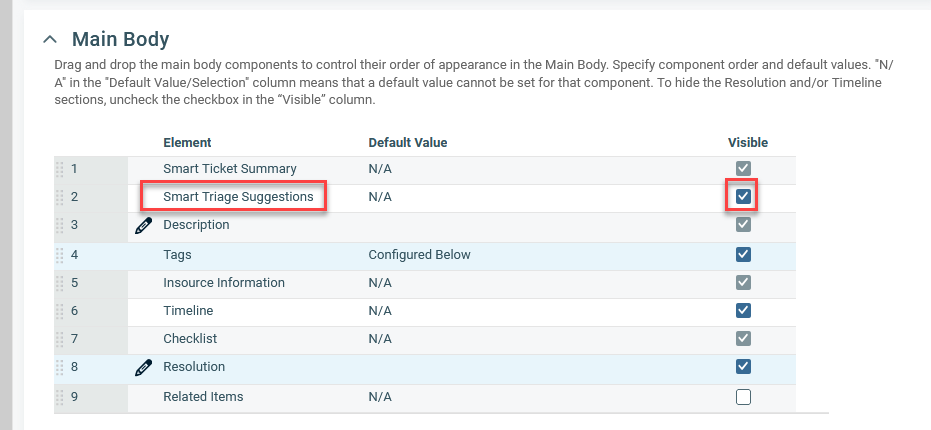
-
From the Insights tab of the same Ticket Category, verify that the Smart Triage insight is moved into the Visible Insights section. Refer to Display or hide an insight for a category for more information.
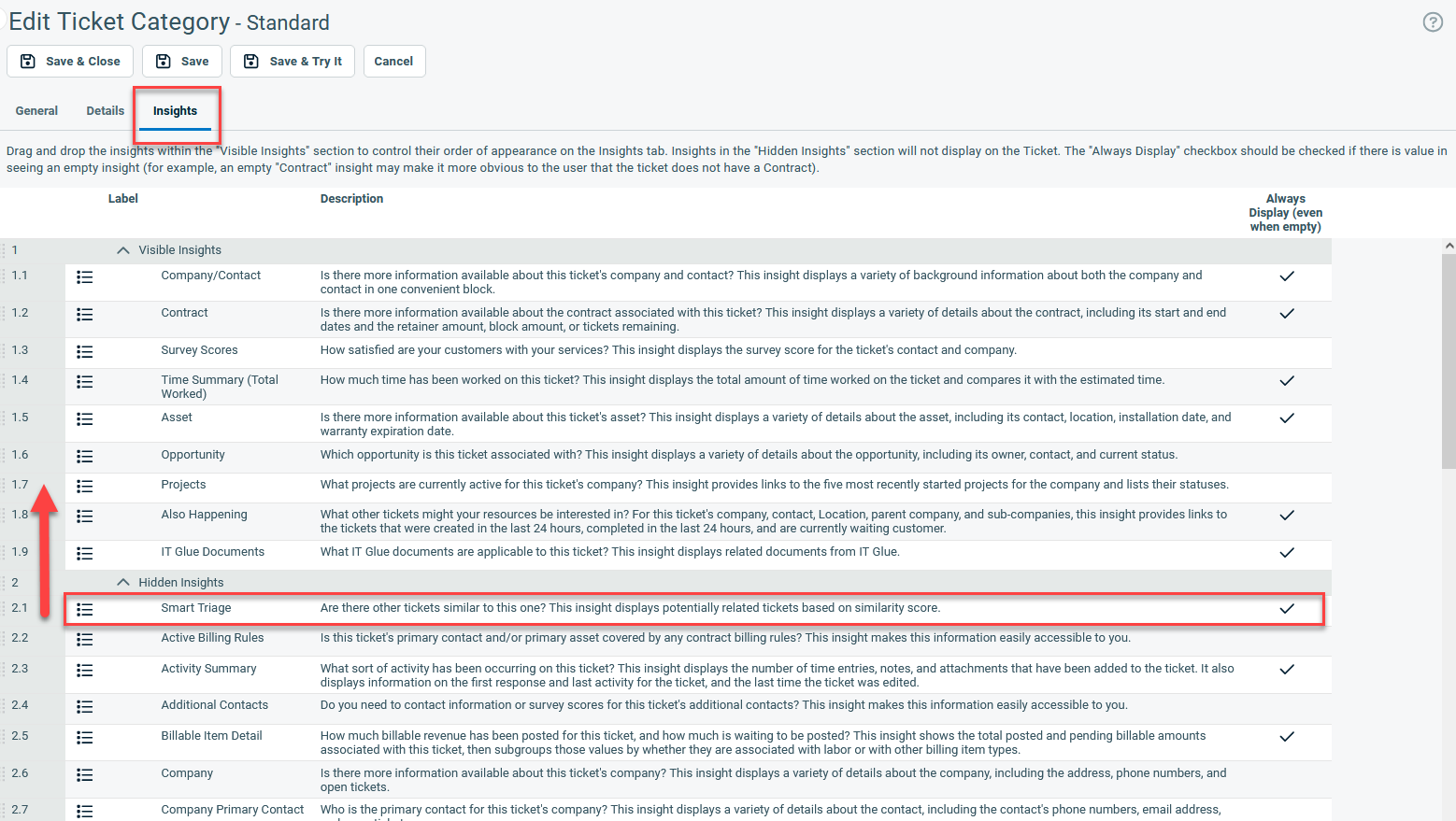
-
Open a ticket that follows the rules defined in the Analyze Existing Tickets section of Ticket Triage.
-
In the Smart Triage Suggestions field, click Analyze Ticket. Cooper Copilot analyzes similar tickets to suggest possible values for ticket fields.
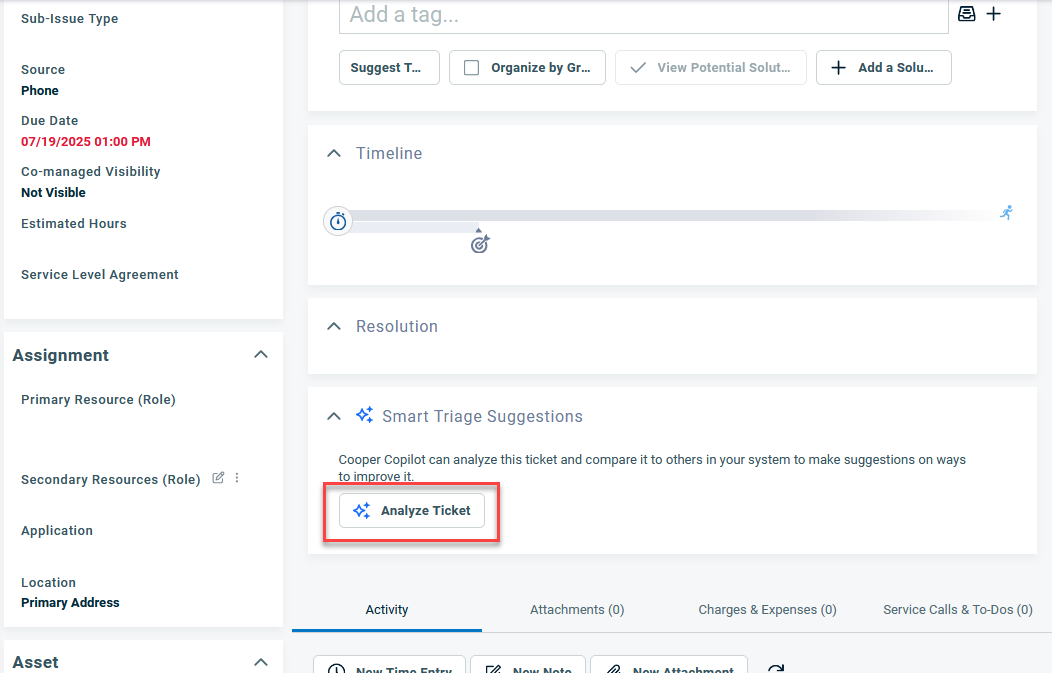
NOTE Smart Triage Suggestions must be made visible in the Ticket Category for the Analyze Ticket button to appear. Refer to Main body for more information.
-
To update the ticket with the suggested changes, click Apply Selected Suggestions. The suggested changes are applied to the ticket. You can view the Ticket History to see what changes were applied. Refer to Viewing the ticket history.
NOTE Smart Ticket Triage suggestions can only be applied once per ticket.
 Ticket fields eligible for analysis
Ticket fields eligible for analysis
There are 10 fields that can be updated based on triage patterns:
-
Additional Devices / Configuration Items / Assets
-
Contact
-
Contract
-
Device / Configuration Item / Asset
-
Issue & Sub-Issue
-
Location / Address
-
Priority
-
Service Level Agreement (SLA)
-
Tags
-
Ticket Category
-
NOTE Ticket analysis uses only the historical data from the ticket’s organization.
-
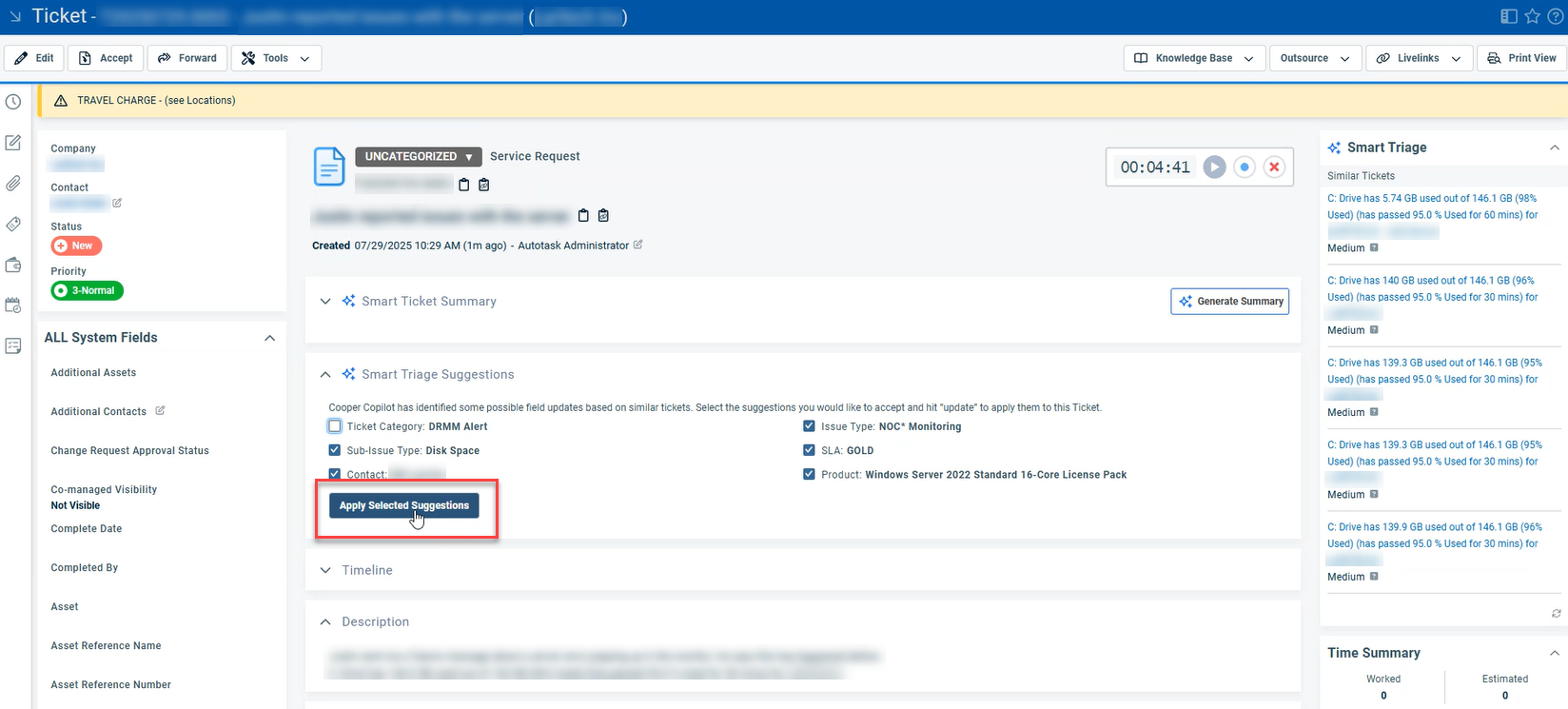
Refer to Cooper Copilot History.
